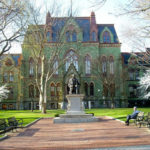What is Syracuse University Known for?
What’s Covered:
- Overview of Syracuse Admissions
- Unique Aspects of Syracuse
- What are your chances of acceptance at Syracuse?
Located in Syracuse, New York, Syracuse University was founded in 1870. Over more than a century and a half, the university has produced Pulitzer Prize winners, Nobel laureates, Olympic medalists, Academy Award recipients, and high-ranking government officials.
Joyce Carol Oates, Aaron Sorkin, and Vanessa Williams are all Syracuse University alumni. And another famous graduate? The 46th president of the United States, Joe Biden, earned his Juris Doctor (JD) degree from the university.
Want to learn more about Syracuse? Keep reading to find out all about the research university’s claims to fame.
Overview of Syracuse Admissions
Location: Syracuse, NY
Undergrad Enrollment: 15,957
Acceptance Rate: 46%
Middle50% SAT: 1270-1440
Middle 50% ACT: 29-32
Syracuse admissions is moderately selective. Students can apply via the Common Application or Coalition Application; all applicants will also need to write a short essay explaining why they’re interested in Syracuse and how they’ll contribute to the campus community.
Since Syracuse is selective, you’ll need strong essays and extracurriculars in addition to solid academics. The “Why This College?” essay is especially important. Find a couple of specific aspects of Syracuse that deeply resonate with you and your goals to explain why the school is a good fit.
Unique Aspects of Syracuse
Location
Syracuse is the fifth-largest city in New York State and the snowiest metropolitan area in the U.S. The eponymous university sits atop a hill overlooking the city itself. Syracuse is home to numerous attractions, including the Landmark Theatre, the Everson Museum of Art, the Great New York State Fair, and many outdoor activities!
Students and residents flock to the many food, music, and cultural festivals. They also take advantage of the over 170 parks for activities like skiing, ice skating, hiking, swimming, and apple picking. Students can also visit the Museum of Science and Technology (MOST) and the Salt Museum during their downtime.
Academics
Syracuse has 13 schools within the larger university. Housing more than 200 majors and 100 minors, along with over 200 advanced degree programs, Syracuse has something to offer for every student.
The School of Architecture is the fourth-oldest architecture school in the U.S. Its prestigious five-year undergraduate program culminates in a Bachelor of Architecture degree. In addition, the David B. Falk College of Sport and Human Dynamics at Syracuse University has unique offerings in exercise science, food studies, sports management, sports analytics, and more. Syracuse is also home to a top-ranked public affairs program at the Maxwell School of Citizenship and Public Affairs.
Other schools within Syracuse that offer bachelor’s degree programs include:
- College of Arts and Sciences
- College of Engineering and Computer Science
- School of Education
- School of Information Studies
- Martin J. Whitman School of Management
- College of Visual and Performing Arts
- S.I. Newhouse School of Public Communications
Across its many schools and colleges, Syracuse offers a number of off-the-beaten-path courses. These classes range from Introduction to Space Flight, in which students learn about mission design, orbit determination, and flight path control, to Blockchain Management, where students develop, implement, and pitch their own blockchain project.
Syracuse students are well supported throughout their studies. Resources such as the Falcone Center foster entrepreneurial efforts and help students pursue goals beyond the classroom with strong backing from the university. Meanwhile, nearly half of Syracuse students participate in study-abroad programs spanning 60 countries worldwide.

[amp-cta id="9459"]
Extracurriculars
Syracuse is well known for the Orange. Its basketball team has won three National Championships, one NCAA tournament championship, and a record 51 consecutive winning seasons. Moreover, Greek life is an important aspect of extracurricular life at Syracuse. Around a quarter of students participate across over 50 organizations on campus.
If athletics and fraternities or sororities aren’t for you, there are plenty of other activities available. Love music? Join one of several a cappella groups, such as The Mandarins. Want to become more active and physically fit? Check out CHAARG, an organization that partners with fitness studios to provide activities like salsa classes. Overall, there are many activities across a range of niches, ranging from writing to movie screenings.
Traditions
Syracuse has amassed a number of traditions over the course of its long, illustrious history. One example is the Goon Squad, which introduces new students during Welcome Week to the spirited campus community—wearing bright shirts, offering a helping hand, cheering loudly, and welcoming them into Otto’s Army, the university’s official student cheering section.
Another tradition takes place on National Orange Day, which coincides with the anniversary of Syracuse’s founding. The community celebrates with events and other goings-on, emphasizing the importance of staying connected. Another not-to-miss tradition is Orange Central, a combination of homecoming and reunion weekend. The event draws thousands of alumni, who flock to campus to join the festivities.
And don’t miss Mayfest! This is an annual end-of-year celebration that features a Block Party concert. There’s also the Winter Carnival, which has plenty of festivities. In 2005, attendees built the world’s largest snowball at the time.
Dorms
All freshmen and sophomores live on campus in residence halls. Another option for incoming first-year students is to live in one of the more than 25 living-learning communities. In these residences, students live among peers who share their interests, such as major or minor programs. These students will participate in events and activities and enjoy faculty support for their cohorts.
Living learning communities fall under these broad themes:
- Arts and expression
- Business and management
- Cultural exploration and diversity
- Education
- Leadership and citizenship
- Science, technology, engineering, and math
- Global connections
- Honors
- Theme housing
What Are Your Chances of Acceptance at Syracuse?
Syracuse is a moderately selective school, but your personal chances of admission depend on your unique profile. Using CollegeVine’s free chancing engine, you can learn your real odds of getting into Syracuse based on your profile, which encompasses your GPA, SAT/ACT scores, extracurriculars, and other factors.




